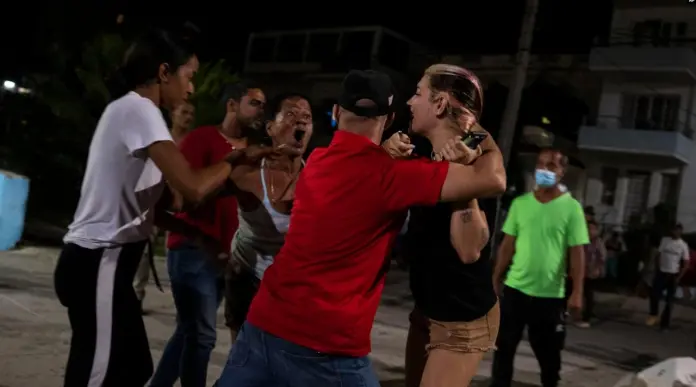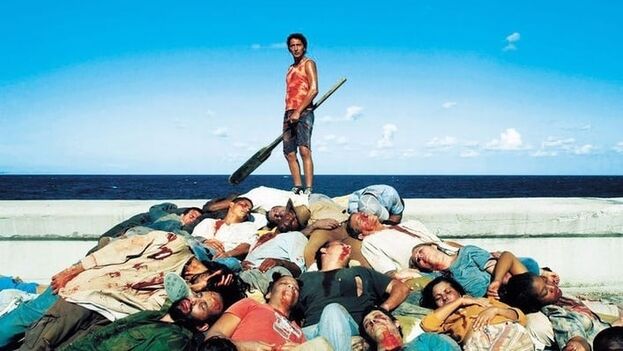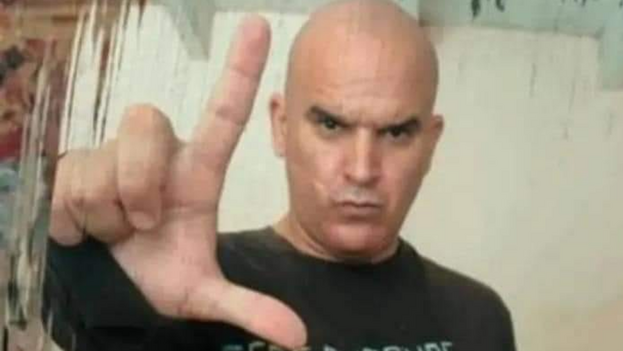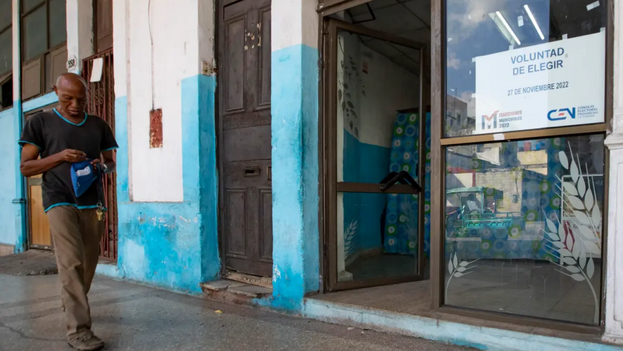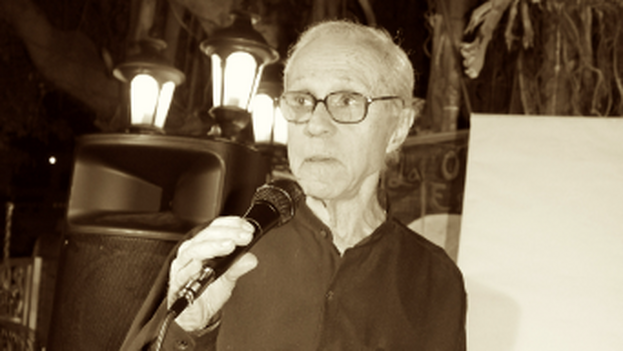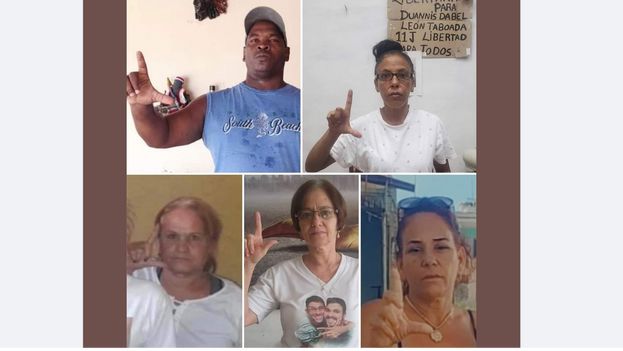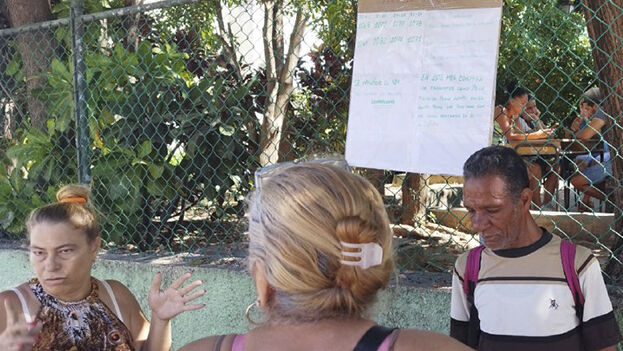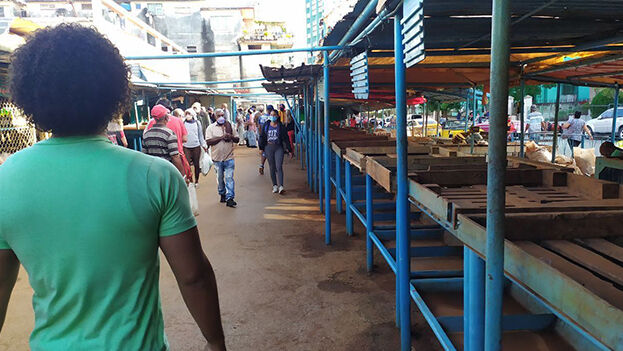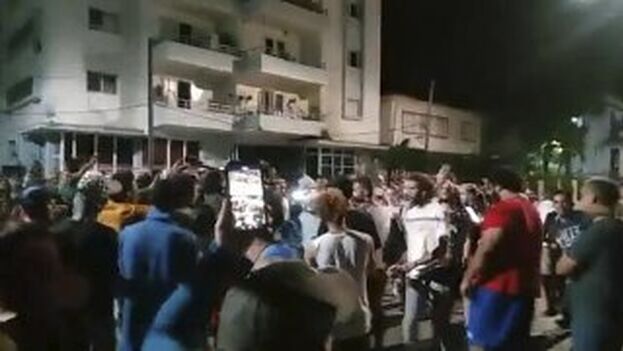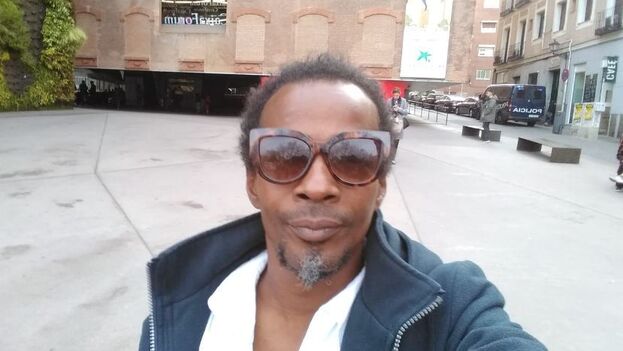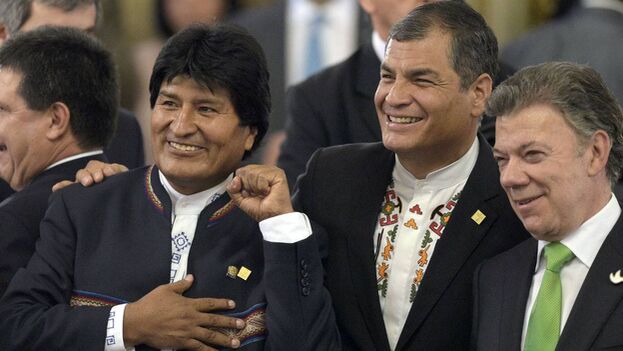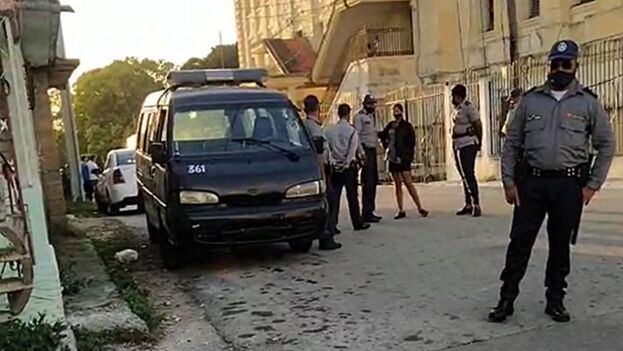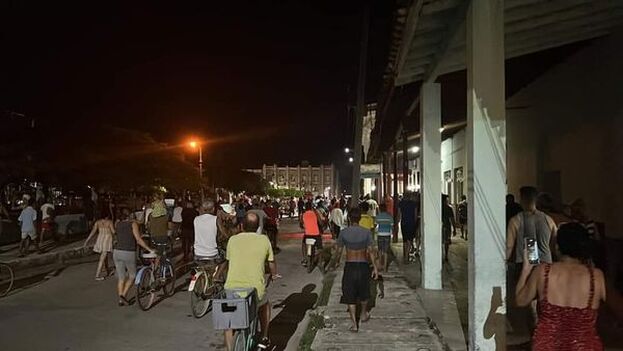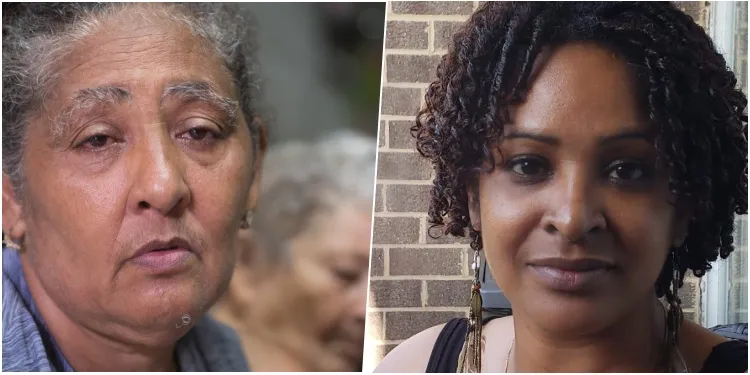Later, the siblings were transferred to the police unit on Zapata and C in Havana, where they remained under arrest without being able to see their parents until October 7th when they were allowed to see their parents separately during a visit of a mere ten minutes. It is important to highlight that during the month when both were under arrest in the same police station, they were not allowed to see each other.
During his parents’ first visit, what was most notable was Frank Artola Plasencia’s deplorable physical condition. He still had visible signs of the beating; his face still bruised and swollen, lacerations in his abdomen and multiple friction burns on his legs. He told his mother he had trouble sleeping due to the pain.
The authorities informed their parents that Frank and Hillary are accused, supposedly, of the crimes of contempt and resistance. To date, the Prosecutor has denied various requests for a change in status for them to await the trial at home. Havana’s Provincial Tribunal also denied the Habeas Corpus request which denounced the arbitrary and illegal nature of the arrest.
As of this writing, we are unaware of any open criminal investigation against the perpetrators who were denounced in statements presented to the prosecutor and the tribunal. If those who abused their power and continue reading
exercised state-sponsored violence are not investigated, tried and sanctioned, the Cuban government will continue to be responsible for torture and mistreatment for not complying with its international obligations such as ensuring that these acts are not repeated.
Their parents are demanding the immediate release of the siblings.
Cubalex calls on the government to immediately release all peaceful protesters from July 11, 2021 (11J) and later protests and for the citizenry to continue denouncing the repressors to fight against the impunity.
Chronology
Eighteen-year-old student, Frank Artola Plasencia, and his sister, 26-year-old self-employed single mother Hillary Gutiérrez Plasencia, were beaten and detained on October 2nd, 2022 by Cuban paramilitary forces and since then remain unjustly incarcerated by the Cuban government.
On Saturday, October 1st, at approximately 9:00 pm, local time in Cuba, a group composed mostly of area residents met to peacefully protest at the intersection of Línea Avenue and Calle F, in El Vedado, in the Plaza de Revolución municipality of Havana. At that time, some members of the accredited foreign press in Cuba were present to cover the events.
The protest, according to local witnesses and the foreign press, developed peacefully. Mostly through chants and banging on pots, the demands of the protesters were centered on demands for freedom and the reestablishment of electrical service, which had been frequently interrupted for months. At one point, around a dozen government functionaries, among them the Secretary of Cuba’s Communist Party (PCC) of the municipality, Plaza de la Revolución, Leira Sánchez Valdivia, and officials of the People’s Assembly appeared on the scene to meet with the protesters and engage in a heated but peaceful discussion. The images show the place surrounded by uniformed police forces and, what local witnesses describe as paramilitary forces dressed in civilian clothing.
During the discussion with protesters, the government officials reiterated the right to peacefully protest, according to local witnesses and the CNN correspondent in Havana, Patrick Oppmann. While the protests developed at the intersection of Línea Avenue and F Street, two blocks away, in the nearby intersection of Calzada and F and the Hotel Presidente, paramilitary forces dressed as civilians and transported to the area in government military trucks, began to assemble. Once the protests dissolved, the government forces began the arrests. In the days that followed, photographs taken by Associated Press (AP) correspondents, showed the violence exercised during the arrests.
As the protests ended, the police and paramilitaries forced the protesters to retreat toward Calle F where there are few street lights, in the direction of a group of paramilitaries who were waiting to attack them. In a series of photographs published by AP, Hillary Gutiérrez can be seen being violently arrested by a member of the paramilitary forces who was also photographed beating an elderly woman, Esmeralda Cárdenas Hidalgo.
Frank Artola Plasencia was beaten unconscious and bloodied by five individuals and had to be transferred to a nearby hospital to receive medical attention for multiple injuries he suffered to the abdomen, legs and face, including a broken nose and lips. In the General Calixto García Hospital, at 2:20 am on October 2nd, Dr. Sanjay Ramanrine of the hospital’s General Surgery Department, issued a medical report which understated the severity of the injuries inflicted upon Frank. The report was filed at the hospital by Mr. Gerardo Limea under order number 05128. The cases of Frank Artola Plasencia and his friend, 38-year-old José Adalberto Fernández Cañizares were especially significant for their cruelty and the severity of their injuries.
They were all held at nearby school facilities occupied by paramilitary forces, State Security agents, National Police and representatives of the Communist Party (PCC). Later, they were transferred in vehicles of the Police Special Forces (known as Black Berets or Special Brigades) to be incarcerated, along with other protesters, at the police station located on Zapata Avenue and C Street, in El Vedado.
The siblings’ father, Frank Artola, arrived at the police station at approximately 12:30 am on October 2nd. The police officers at the station confirmed the arrest of several protesters, his children among them, and said that they would be investigated for the scandalous accusation of possible connections with the Central Intelligence Agency (CIA) of the United States of America. Artola vehemently denied these accusations. The police agents refused him the right to see his children and he was told that he would be notified as to when a visit would be possible.
Other protesters who were detained and released the next day communicated to the family that immediately after his arrest and despite his injuries, Frank Artola Plasencia was being interrogated by police.
On Sunday, October 2nd, around 2:00 pm, Artola (father) was contacted by telephone by First Lieutenant Luis Alberto Montes Navarro of the Police Investigations Headquarters located on 100 Street and Aldabó. The official requested that he go to the station as soon as possible to receive information related to his son’s and daughter’s arrests and they requested that he bring hygiene products for their personal use.
Once at the station, Artola was informed that Hillary and Frank were under investigation for the crimes of contempt and resistance. The officials at the center took the hygiene products, but once again, denied him the possibility of seeing his son and daughter. Mr. Artola firmly believes that this denial was due to the severity of his son’s injuries, a suspicion which was later confirmed. At the end of the meeting, the agents communicated to Artola that they had scheduled a visit for him and another family member to see his son and daughter on the following Friday, October 7th at 2:00 pm, six days after the arrest.
For the case to be opened, a complaint must be filed with the police by a citizen:
— Abel Pers Infante, who is employed at the Municipal Directorate of the PCC in Plaza de la Revolución. This individual was identified as one of the leaders of the paramilitary groups that conducted the cruel beatings an the violent arrests of the protesters.
On Monday, October 3rd, Artola (father) visited the Public Defenders’ Office (National Organization of Collective Law Firms), the only organization, controlled by the state, authorize to provide legal representation to the accused. Two contracts dated October 3rd, 2022, were signed by Artola and attorney Carlos Manuel Pérez Ricardo. Since then Mr. Pérez Ricardo has been Hillary Gutiérrez’s and Frank Artola Plasencia’s legal representative.
On Friday, October 7th, Artola (father) and Ibis Plasencia Torres (mother) went to the Police Investigations Headquarters on 100 and Aldabó for the scheduled visits. Frank and Hillary were taken, separately, to see their parents for a period no longer than 10 minutes. This pattern was repeated during the five visits they were permitted, always on Fridays at 2:00 pm.
The first thing his parents noticed was Frank Artola Plasencia’s deplorable physical condition. Signs of the cruel punishment to which he had been subjected were still visible; his face still bruised and swollen, lacerations in his abdomen and multiple abrasions on his legs. He told his mother he still was having trouble sleeping due to the pain. The agents present declared that he was receiving medical attention.
Hillary appeared in the visiting room and immediately began crying, wanted to know about her brother’s condition, as they had not allowed her to see him since the arrests, despite being held in the same center. Her mother assured Hillary that her brother was better. Hillary asked about her six-year-old daughter and her family tried to comfort her and provide security in that sense as well.
At the end of the visit, the parents had a brief exchange with the police authorities in charge of the case. The parents expressed their indignation at the abuses to which their children had been subjected. The police officers recognized that some of the behavior during the arrest were inappropriate but dismissed their petition to conduct an investigation. The police declared that the accused had both signed a written confession and voluntarily agreed to film an apology for their actions, a common practice of the Cuban government for propaganda purposes.
During the weeks that followed the same pattern of separate visits was repeated for each of the siblings. During each visit, the parents reiterated, in vain, their calls for authorities to investigate the abuses committed against Hillary and Frank.
The parents were allowed to visit them at this center on five occasions: October 7th, October 14th, October 21st, October 28th, and November 4th.
During these visits the police agents provided various warnings to Hillary and Frank, as well as their parents. They were all warned not to discuss the case or the visits could be terminated; they warned Hillary not to cry in front of her parents. At no point did they allow the whole family to be together. All visits occurred with one or more police agents nearby. Each individual visit was no longer than ten minutes.
The following is a list of some of the public officials implicated in this case:
Officials in charge of the case pertaining to the unit called the Special Crimes Section (Crimes Against State Security): Lieutenant Colonel Jorge Luis Díaz Jacinto, who is supposedly in charge of this unit. First Lieutenant Yaremis Peña Real, Investigator. Captain Armando Cases Díaz, Investigator. First Lieutenant Luis Alberto Montes Navarro. Captain Michel Carrión.
Prosecutors assigned to the case, members of the Provincial Prosecutor of Havana: Prosecutor Yoandris López Parra, Lead Prosecutor. Prosecutor Yamileidy Rivero García.
On October 19th, the Prosecutor on the case, Yoandris López Parra, in response to a request made by the attorney for the accused, Carlos Manuel Pérez Ricardo, issued a notification denying the request to release the accused to await trial at home. The request was made, taking into consideration, among other circumstances, the young age of the accused, their lack of prior criminal records and the fact that they did not pose a danger to the community.
According to the current law in Cuba, decisions about the length of prison sentences are not made by judges, but by the Prosecutor. The appeal of an unfavorable decision in this sense is also made before the Prosecutor. This appeal was submitted. Later, a resolution was issued confirming they’d be held in jail.
On October 26th, Artola (father) submitted a formal complaint to the Prosecutor, challenging the manner and legality of the arrest. To this day he has not received a response.
On October 31st, a written resolution was issued, signed by Prosecutor Lediher Armas Sánchez of Havana’s Provincial Prosecutor, confirming the incarceration for both of the accused. That same day, Artola (father) presented a writ of Habeas Corpus before the Criminal Court of the Provincial Tribunal in Havana. In this document, he challenges the violent manner and the legality of the arrests of his daughter and son, reiterating the peaceful nature of the protests and stressed that his children do not pose any danger to the community and the peace.
b, three judges of the Second Criminal Court of the Provincial Tribunal of Havana, rejected Artola’s requests detailed in the Habeas Corpus. The judges alleged that, following consultations with the Prosecutor and the police, the did not have proof of mistreatment of the accused and confirmed the legality of their arrest. At no point did the signatory judges request interviews with the accused nor did they request that they be sent before the Tribunal to be interrogated in the case. The signatory judges were:
Judge Ángel García Leyva
Judge Irene Asunción Macía Mondejar
Judge Mérida López Rodríguez
On November 7th, 2022, an appeal was presented before the Criminal Court of the People’s Supreme Court of the Republic of Cuba, challenging the decision made on November 2nd by the Second Criminal Court of the Provincial Tribunal of Havana. According to Cuban law, this tribunal has up to three working days, beginning on the day after the document is submitted, to issue a decision.
On November 7th, both of the accused were transferred from the Police Investigations Headquarters (100 and Aldabó) to facilities of the Cuban Penitentiary System. Hillary Gutiérrez was transferred to the Mujeres de Occidente prison, commonly known as El Guatao or Manto Negro. Frank Artola Plasencia was transferred to a jail for minors known as Jóvenes de Occidente.
On November 8th, Frank Artola Plasencia was allowed a visit in prison by his father and girlfriend. Hillary Gutierrez was denied a visit by her mother; authorities explained that she would remain in isolation for ten days for health reasons.
This entry, Cuban Siblings Frank Artola Plasencia and Hillary Plasencia Remain in Prison, was first published on Cubalex.
Translated by: Silvia Suárez
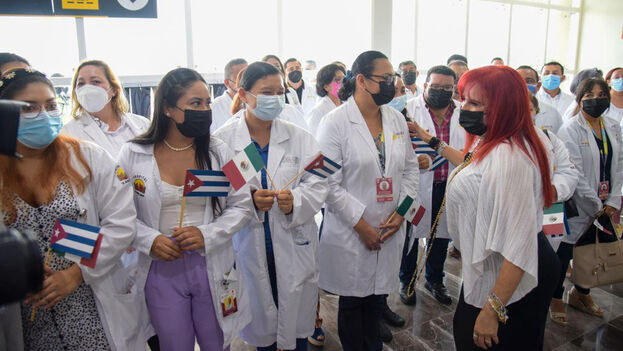
![]() 14ymedio, Havana, 13 December 2022 — On Tuesday, the Madrid-based organization, Prisoners Defenders (PD) launched a harsh critique toward the governments of Mexico, Italy and Qatar for contracting Cuban professionals in “conditions of slavery.”
14ymedio, Havana, 13 December 2022 — On Tuesday, the Madrid-based organization, Prisoners Defenders (PD) launched a harsh critique toward the governments of Mexico, Italy and Qatar for contracting Cuban professionals in “conditions of slavery.”
